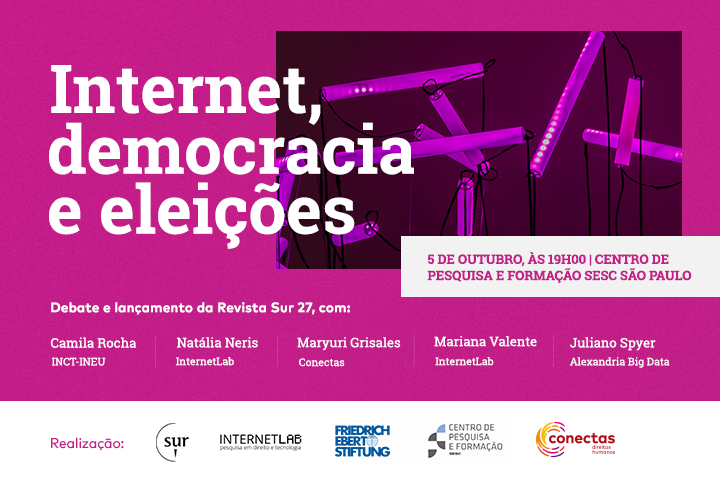The role of the internet at election to be discussed at launch of SUR 27
This event, with limited seats, will be held in the Research and Training Centre at SESC.

There is underlying concern, worldwide, over the role of the internet in political debate, particularly at the time of elections. As well as in Brazil, 2018 is election year in many other countries too – Colombia, Costa Rica, Egypt, Mexico, Russia and Turkey. And everywhere there is disquiet about the positive and negative influence that networks have on how people vote.
And it is precisely at this time that the Sur Magazine – International Journal on Human Rights, by Conectas in partnership with InternetLab and Friedrich Ebert Stiftung, is publishing its special edition on “Internet and Democracy” with contributions on this subject, from around the world.
At this launch, the publication will bring together some of the principal movers and shakers on this subject to discuss topics like targeting political messages at specific groups of social network users (the theme at the centre of the Cambridge Analytica scandal in the first half of the year), online wars and polarisation, the use of the internet for political discussion and activism and the relationship between the internet and the rise of new social players.
Read more
Juliano Spyer’s book: “Mídias Sociais no Brasil Emergente” (UCL Press, 2018) will be launched in Brazil, at the event.
Online registration will be possible up to one day before the start of the event. After this it will be possible to register in person at any branch, as long as there are still seats available. It will not be possible to register after the start of the event.
If you require accessibility resources such as sign language, audio description or others, please send a request via email: centrodepesquisaeformacao@sescsp.org.br or call: +55 (11) 3254-5600, up to 48 hours before the start of the event
Speakers

Mariana ValenteDirector at InternetLab. She holds a Doctorate in Law at USP and is a member of the Núcleo Direito e Democracia (Law and Democracy Hub) at CEBRAP (Brazilian Centre for Analysis and Planning). She was Visiting Researcher at UC Berkeley and Researcher and Lecturer at the FGV Centre for Technology and Society. (Photo: personal archive)

Natália Neris
Currently on a Human Rights doctoral programme at USP. She is a Researcher at the Núcleo de Direito e Democracia (Law and Democracy Hub) at CEBRAP (Brazilian Centre for Analysis and Planning) and at GEPPIS (Research and Study Group on Public Policy for Social Inclusion) at USP. She is currently Coordinator of the Inequality and Identity department at InternetLab – Research on Law and Technology. (Photo: personal archive)

Camila Rocha
Currently on a Political Science doctoral programme at USP. She is a member of the Working Group on Contemporary Rights: dictatorships and democracies, linked to CLASCO (Latin American Council for Social Sciences), and is a Researcher at INCT-INEU (National Institute of Science and Technology for Study of the United States).
(Photo: personal archive)

Juliano Spyer
Doctor in Digital Anthropology at University College London. He holds the position of Head of Human Insights at www.alexandria.ai.
(Photo: personal archive)
Mediator

Maryuri Mora Grisales
Doctor in Religious Sciences at UMESP. She is a participant on the Conectas Strengthening Democratic Space programme and is the Assistant Editor of the Sur Magazine.
(Photo: personal archive)






